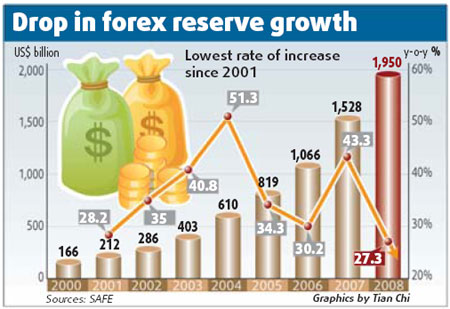
|
BIZCHINA> Top Biz News
 |
|
Growth rate of forex reserve falls
By Wang Xu (China Daily)
Updated: 2009-01-14 07:32 The country's foreign exchange (forex) reserve increased by $417.8 billion last year, $44.1 billion less than in 2007, the People's Bank of China (PBOC) said on Tuesday. The central bank also said the supply of money and loan growth picked up in December, reflecting the government's effort to boost the economy through proactive fiscal and moderately loose monetary policies. The country's forex reserve increased by less than $45 billion in the fourth quarter to $1.95 trillion by the end of 2008, a PBOC report said. The reserve growth slowed over the months last year. The total reserve was up 27.34 percent over 2007, the lowest rate since 2001.
The fall in the growth rate is the result of a shrinking trade surplus and a possible slowdown in the inflow of "hot money", analysts said. But despite the slowing of the reserve growth for the whole of last year, the monthly reserve for December increased $61.3 billion, up $30 billion year-on-year, the PBOC said. The fourth quarter's reserve, though, dropped compared to the same period in 2007. Guo Tianyong, a Central University of Finance and Economics professor, said expectations that the yuan would weaken and extraction of capital from the domestic market to help stabilize the supply of capital in the West were major factors that caused a year-on-year drop in the fourth quarter reserve. December saw a sharp rise in the reserve as the Central Economic Work Conference vowed early that month to keep the yuan stable - at a reasonable and balanced level - he said. That reversed expectations of a weaker yuan. The government has been worried over "hot money" being brought into the country by businesses and individuals speculating on the continuous rise of the yuan. It fears that it would create asset bubbles and increase the pressure for the yuan's revaluation, making the domestic financial system vulnerable.
The flow of "hot money" into the country, however, began to dry up after some developed countries de-leveraged their financial markets to overcome the global financial crisis, the analysts said. Money supply As the money supply picked up in December, M2, which includes cash and all types of deposits and indicates overall liquidity in the financial system, increased 17.8 percent year-on-year. It had risen 14.8 percent in November. Banks extended 772 billion yuan in new loans in December, compared to 476.9 billion yuan in November. That helped the annual loan growth to accelerate to 18.76 percent in December, up 2.66 percentage points year-on-year. The annual growth of money supply including cash in circulation and demand deposits, or M1, was 9.06 percent in December compared to a 6.8 percent in November. The growth suggests the recent aggressive cuts in banks' reserve requirement ratios have helped improve liquidity, said Jing Ulrich, chairman of China equities at JPMorgan. The PBOC has cut interest rates five times, totaling 2.16 percentage points, since September. It has reduced the amount of deposit that lenders have to set aside to boost liquidity, too. Earlier, policymakers said the government would try to ensure a 17 percent M2 growth this year despite the economic slowdown. The moves, the analysts said, are expected to encourage banks to issue new loans, which are crucial for the government to deliver the $586-billion stimulus package. But some economists fear that increased lending could lead to a spurt in bad loans because returns from infrastructure projects are less predictable than what they were a decade ago. Ten years ago, the government began building a wide network of highways and other infrastructure as part of its fight against the Asian financial crisis. "The boost to the economy is obvious in the short term," said Ha Jiming, an economist with China International Capital Corporation. "But we need to keep an eye on the risk for lenders."
 (For more biz stories, please visit Industries)
|
久久精品aⅴ无码中文字字幕不卡| 亚洲欧美日韩一区高清中文字幕| 一本久中文视频播放| 无码人妻精品一区二区三18禁| 性色欲网站人妻丰满中文久久不卡| 免费A级毛片av无码| 无码丰满熟妇juliaann与黑人| 欧美日韩久久中文字幕 | 狠狠躁天天躁中文字幕无码| 色综合久久中文字幕无码| 中文字幕精品视频在线| 人妻少妇久久中文字幕一区二区| 无码AⅤ精品一区二区三区| 久久久久久久亚洲Av无码| 亚洲成A人片在线观看无码不卡 | 中文字幕亚洲精品资源网| 亚洲人成人无码网www国产| 精品爆乳一区二区三区无码av| 伊人久久精品无码av一区| 亚洲欧美成人久久综合中文网 | 中文字幕人妻中文AV不卡专区| av无码久久久久不卡免费网站| 亚洲AV无码乱码国产麻豆| 少妇性饥渴无码A区免费 | 中文字幕乱码免费看电影| 中文在线√天堂| 日本乱中文字幕系列观看| 日韩精品久久无码中文字幕| 亚洲中文字幕无码专区| 亚洲免费无码在线| 一区二区三区无码高清视频| 亚洲国产成人精品无码久久久久久综合| 国产99久久九九精品无码| 国产高新无码在线观看| 国产午夜无码片免费| 无码乱码观看精品久久| 久久久久亚洲AV无码专区桃色| 伊人蕉久中文字幕无码专区| 精品久久久久久中文字幕| 久久午夜无码鲁丝片| 午夜不卡久久精品无码免费|